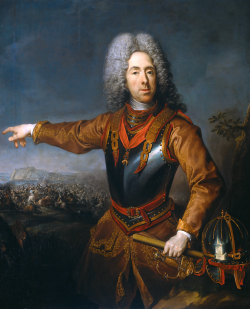Queer Places:
St Stephen, Stephansplatz 1, 1010 Wien, Austria
 Prince Eugene of Savoy (18 October 1663 – 21 April 1736) was a general of
the Imperial Army and statesman of the Holy Roman Empire and the Archduchy of
Austria and one of the most successful military commanders in modern European
history, rising to the highest offices of state at the Imperial court in
Vienna.
Prince Eugene of Savoy (18 October 1663 – 21 April 1736) was a general of
the Imperial Army and statesman of the Holy Roman Empire and the Archduchy of
Austria and one of the most successful military commanders in modern European
history, rising to the highest offices of state at the Imperial court in
Vienna.
Born in Paris, Eugene grew up around the French court of King Louis XIV.
Based on his poor physique and bearing, the Prince was initially prepared for
a career in the church, but by the age of 19 he had determined on a military
career. Following a scandal involving his mother Olympe, he was rejected by
Louis XIV for service in the French army. Eugene moved to Austria and
transferred his loyalty to the Habsburg Monarchy.
Spanning six decades, Eugene served three Holy Roman Emperors: Leopold I,
Joseph I, and Charles VI. He first saw action against the Ottoman Turks at the
Siege of Vienna in 1683 and the subsequent War of the Holy League, before
serving in the Nine Years' War, fighting alongside his cousin, the Duke of
Savoy. However, the Prince's fame was secured with his decisive victory
against the Ottomans at the Battle of Zenta in 1697, earning him Europe-wide
fame. Eugene enhanced his standing during the War of the Spanish Succession,
where his partnership with the Duke of Marlborough secured victories against
the French on the fields of Blenheim (1704), Oudenarde (1708), and Malplaquet
(1709); he gained further success in the war as Imperial commander in northern
Italy, most notably at the Battle of Turin (1706). Renewed hostilities against
the Ottomans in the Austro-Turkish War consolidated his reputation, with
victories at the battles of Petrovaradin (1716), and the decisive encounter at
Belgrade (1717).
Throughout the late 1720s, Eugene's influence and skilful diplomacy managed
to secure the Emperor powerful allies in his dynastic struggles with the
Bourbon powers, but physically and mentally fragile in his later years, Eugene
enjoyed less success as commander-in-chief of the army during his final
conflict, the War of the Polish Succession. Nevertheless, in Austria, Eugene's
reputation remains unrivalled. Although opinions differ as to his character,
there is no dispute over his great achievements: he helped to save the
Habsburg Empire from French conquest; he broke the westward thrust of the
Ottomans, liberating central Europe after a century and a half of Turkish
occupation; and he was one of the great patrons of the arts whose building
legacy can still be seen in Vienna today. Eugene died in his sleep at his home
on 21 April 1736, aged 72.
Despite being one of the richest and most celebrated men of his age, Eugene
never married and the suggestion is that he was predominantly homosexual.
History knows little of his life before 1683. In his early boyhood in Paris
"he belonged to a small, effeminate set that included such unabashed perverts
as the young abbé de Choisy who was invariably dressed as a girl" wrote the
English historian Nicholas Henderson in the 1960s.[113]
The Duchess of Orléans, who had known Eugene from those days, would later
write to her aunt, Princess Sophia of Hanover, describing Eugene's antics with
lackeys and pages. He was "a vulgar whore" along with the Prince of Turenne,
and "often played the woman with young people" with the nickname of 'Madame
Simone' or 'Madam l'Ancienne'. He preferred a "couple of fine page boys" to
any woman, and was refused an ecclesiastical benefice due to his "depravity".[7][114]
OOf related interest is a popular soldier's song which parodied an imaginary
voyage by Eugene and the marquis de la Moussaye on the Rhine. A storm breaks
and the general fears the worst, but the Marquis consoles him: "Our lives are
safe/ For we are sodomites/ Destined to perish only by fire/ We shall land." A
comment made by Johann Matthias von der Schulenburg in 1709, who had served
under Eugene, could be read that the prince enjoyed "la petite débauche et la
p[ine] au-delà de tout," or that he derived his sexual gratification from the
virile member of others.[115]
My published books:


BACK TO HOME PAGE

- https://en.wikipedia.org/wiki/Prince_Eugene_of_Savoy#References
 Prince Eugene of Savoy (18 October 1663 – 21 April 1736) was a general of
the Imperial Army and statesman of the Holy Roman Empire and the Archduchy of
Austria and one of the most successful military commanders in modern European
history, rising to the highest offices of state at the Imperial court in
Vienna.
Prince Eugene of Savoy (18 October 1663 – 21 April 1736) was a general of
the Imperial Army and statesman of the Holy Roman Empire and the Archduchy of
Austria and one of the most successful military commanders in modern European
history, rising to the highest offices of state at the Imperial court in
Vienna.
